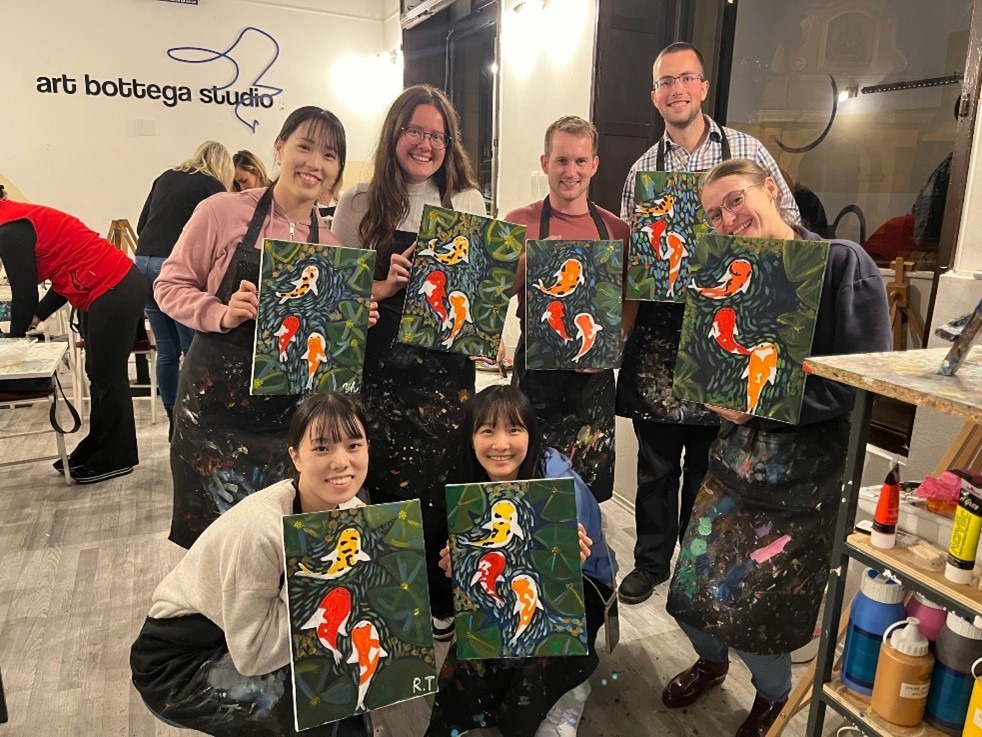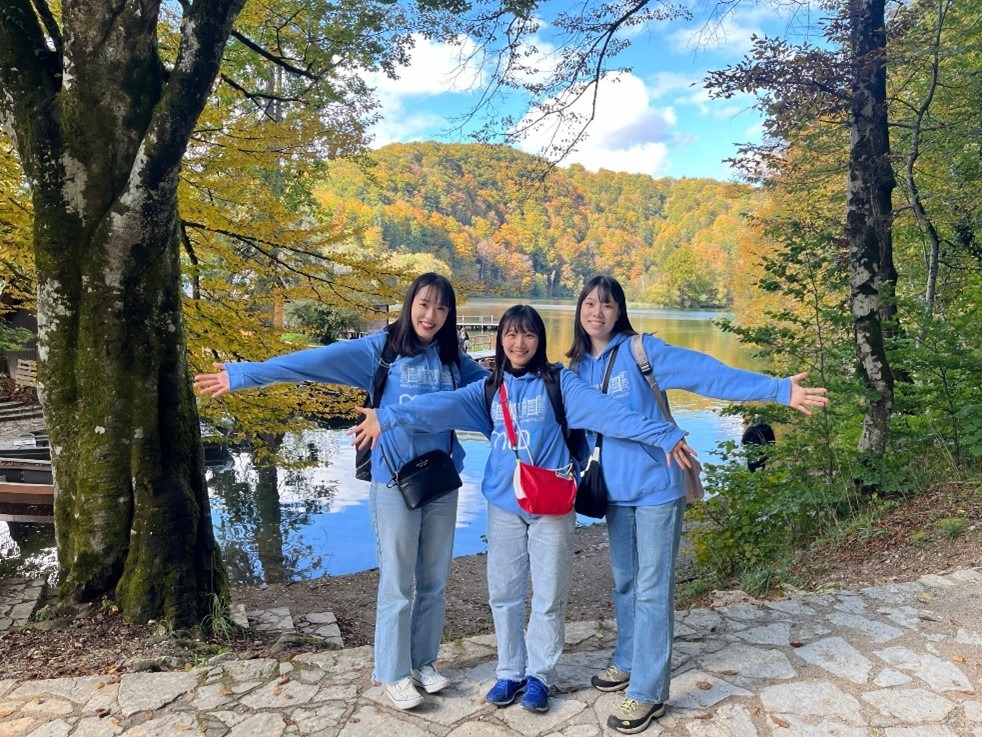International and Domestic exchange
Rinka Takahashi (5th grade)
Rinka in Rijeka
Dobro jutro! Zovem se Rinka. Ja sam Japanka. Drago mi je da smo se upoznali.
I had practiced many times in Japan so that I could introduce myself in Croatian, and it paid off because the supervising doctors and nurses I met on the first day of my internship were surprised by my Croatian and welcomed me warmly. During the first half of my one-month study abroad period, I was assigned to the Gastroenterological Department, and during the second half, to the Obstetrics and Gynecology Department. I would be happy to share with readers of this website not only the details of my internship, but also my life over there and my impressions after returning home.
The first thing that surprised me when I visited the hospital was that no one was wearing a mask. When I went to the patient's room on my rounds, I was shocked to see that there were no curtains separating the rooms like in Japanese hospitals, and that there was no private space for the patients. The conversation between the doctor and the patient was overheard by the patient next to me, so I wondered if there was any need to be considerate of privacy. The rounds were made by about 15 medical staff, including professors, specialists, residents, and nurses, and I was very worried that the patients would become intimidated and not be able to say what they wanted to say because so many people gathered at the bedside at once. However, they were not intimidated by the professor, and they clearly communicated their intentions and enjoyed the conversation. When I saw the doctor sitting on the bed to explain the patient's condition, I felt that by adjusting their eye level, they were able to build better communication. I would like to emulate this closeness between doctors and patients in Croatia, and if I have the opportunity to interact with patients during my hospital training in Japan, I would definitely like to put it into practice.
My best memory from the gastroenterology department is the conversation I had with the professor during rounds. During rounds on a patient with cirrhosis and psoriasis, the professor suddenly turned over the bed and asked me, "Do you know what this disease is?" The patient had a characteristic rash on both lower legs, and I immediately knew it was psoriasis, but I didn't know what to say in English, so I answered, "I know about this disease, but I don't know what it's called in English." It was a truly unexpected event that I was asked a question about dermatology during my gastroenterology rotation, and I was unable to respond. The professor explained psoriasis to me on the spot, and everything was fine, but I was left with only a feeling of regret. This was because I remembered that I learned the name of psoriasis in my English class in the lower grades. Two days later, during rounds, when I came to the bed of the same patient, the professor asked me again, "Do you remember what disease this patient had other than cirrhosis?" I was able to answer with confidence, "Psoriasis." He praised me by saying, "Because you are still young, you can learn anything quickly and understand quickly." He also said, "You need to pay attention not only to digestive diseases but also to diseases in other departments." This professor was by no means fluent in English, but he tried his best to explain the patient's condition in English for me, a foreign student. There is no need to write how much this kind consideration helped me during rounds where Croatian was everywhere. The resident doctors also made time to explain things to me in English during outpatient and examination observations so that I would not get bored, and I cannot thank them enough. On the last day of my training, I received a textbook signed by all the doctors, which became a treasure that I want to cherish for the rest of my life.
The most memorable experience in the obstetrics and gynecology department was observing a vaginal birth. I had never had the chance to observe a birth in Japan, so I was looking forward to this event, which was my first experience in my life, even before my training. When I actually witnessed a birth, I couldn't help but tear up at the mystical sight. The mother desperately enduring the pain, and the father with a painful expression as he watched the mother in pain. The doctor performing the procedure while talking to the mother, and the nurse helping him. Everyone in the delivery room was looking forward to the baby being born. Finally, the moment came, and the umbilical cord was cut by the father's hands, and the mother was able to meet her baby safely. When I saw the mother crying while holding her baby, I thought that of all the jobs in the world, the most difficult is "being a mother." She gives birth to a child, protects and raises it, even while losing a lot of blood and putting her own life at risk. I also imagined the difficult experiences my mother had when I was born, and remembered my parents in Japan, and I couldn't stop crying even more.
So far I have been talking about my training there, but let me share some bitter memories from my daily life. In order to purchase a city bus pass, I needed a personal number similar to Japan's My Number, but I had to stand and wait for more than an hour to apply for it. When I thought it was finally my turn, I was shocked and speechless when I was told, "We are going to take a lunch break now, so please come back in 30 minutes." With the paper with my personal number written on it in one hand, I next lined up at the bus company. By the time I finally got my pass, it was literally dark. This was not the only mishap. When I went on a trip with a friend on the weekend, we took a long-distance bus, but an incident occurred where the bus departed while I was at the restroom at the rest area. My friend desperately asked the driver to stop the bus. I still shudder to think what would have happened if I hadn't had my friend there.
Looking back over the past month, this study abroad program would not have been possible without the help of many people. I would like to thank the doctors and staff at the hospital who looked after me, Paola from the International Exchange Division at the University of Rijeka, the staff who greeted me every morning in the cafeteria, the driver who took me to and from the airport and the dormitory, and even the stranger who taught me how to use the washing machine at the laundromat. I would like to especially mention the three medical students who came to Hyogo Medical University Medicine as an exchange student just before I went to Croatia and became friends with them. Just as in Japan, we deepened our relationship by going to Osaka Castle and Nunobiki Herb Garden and eating meals together, in Rijeka they invited me to painting classes and bowling, and we had a great time together. I couldn't leave Croatia without tears, but I believe that I will be able to meet them again someday. I would also like to express my sincere gratitude to the two classmates who participated in this program with me, including the long-distance bus incident.
I would like to end with this word. It was the Croatian word I spoke the most during my one month of studying abroad. Hvala! (Thank you!)

